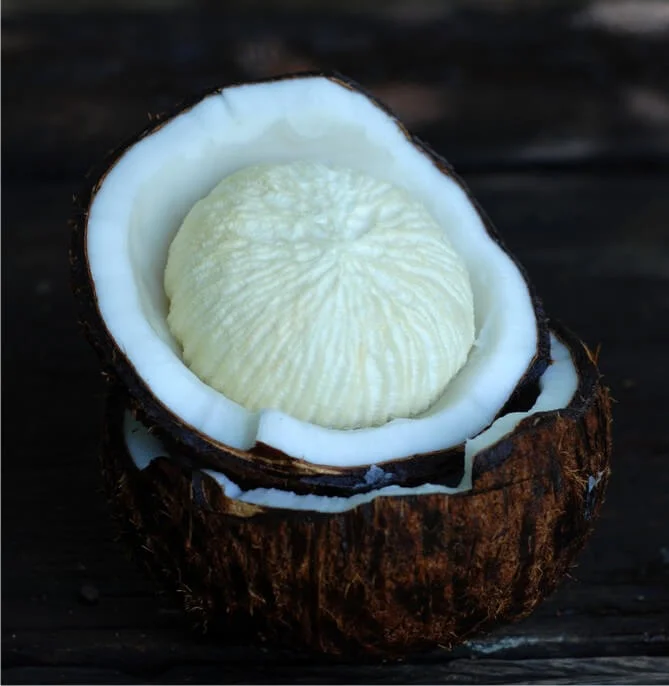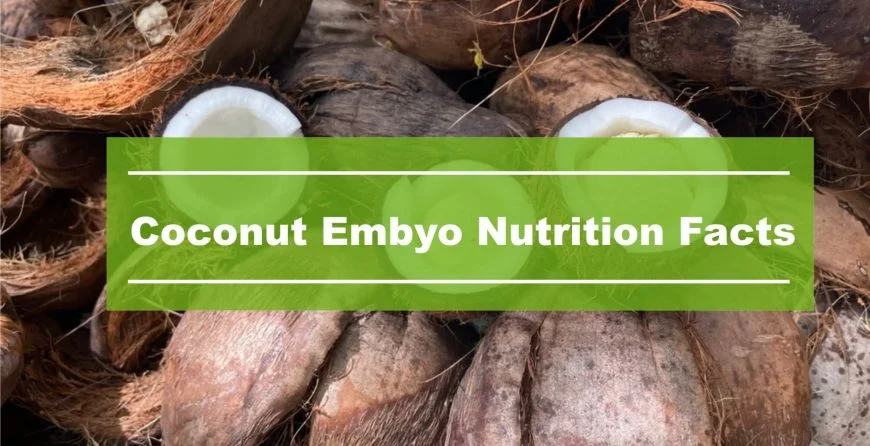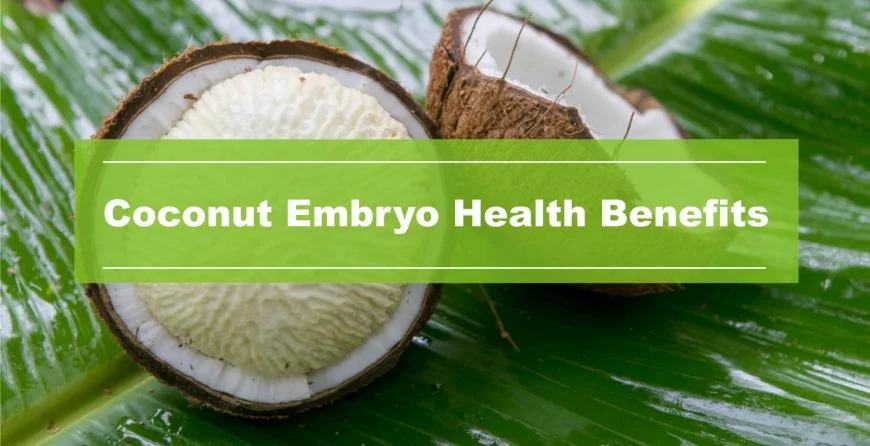What you Want, Find Here ↓
ToggleHere we discuss about coconut embryo nutrition facts, its a nutrient-rich food that has several health benefits when compared to other nuts.
Coconuts are not only delicious, but they’re also packed with nutrients that can benefit your health. Here are some interesting facts about the nutrition of coconut embryos.
Coconut embryos are a good source of dietary fiber. In fact, just one tablespoon of coconut embryo contains 2 grams of dietary fiber. This helps to keep your digestive system healthy and prevents constipation.
Coconut embryos are also a good source of protein. One tablespoon of coconut embryo contains 4 grams of protein. This makes them a perfect food for vegetarians and vegans who want to increase their protein intake.
Additionally, coconut embryos are rich in vitamins and minerals, including zinc, iron, magnesium, and selenium. These nutrients are essential for maintaining a healthy immune system, preventing chronic diseases, and supporting proper growth and development.
Health Benefits of Eating Coconut Embryos
Coconut embryos are a rich source of nutrients. They offer numerous health benefits, including: Boosts Immunity: The high fiber and protein content in coconut embryos helps to boost the immune system by boosting healthy gut bacteria and preventing constipation. The high fiber and protein content in coconut embryos helps to boost the immune system by boosting healthy gut bacteria and preventing constipation. Prevents Cancer: Coconut embryo can prevent cancer due to its anti-inflammatory properties. Coconut embryo can prevent cancer due to its anti-inflammatory properties. Anti-Aging: Coconut embryo has the right combination of protein and fibers which helps to boost our immunity system. This helps to prevent aging and gives a glowing skin

Coconut embryo has the right combination of protein and fibers which helps to boost our immunity system.
This helps to prevent aging and gives a glowing skin.
Weight Loss: Coconut embryo has a very low calorie content which helps to lose weight. It increases metabolism and prevents fat storage in the body. Coconut embryo has a very low calorie content which helps to lose weight. It increases metabolism and prevents fat storage in the body.
Anti-Inflammatory: Coconut embryo is a very effective anti-inflammatory agent. It reduces inflammation and swelling in the body. Coconut embryo is a very effective anti-inflammatory agent. It reduces inflammation and swelling in the body.
Antioxidant: Coconut embryo contains a variety of essential nutrients, such as vitamin E, Vitamin C and pro-vitamin A. These vitamins are very effective antioxidants. Coconut embryo contains a variety of essential nutrients, such as vitamin E, Vitamin C and pro-vitamin A. These vitamins are very effective antioxidants.
Anti-inflammatory: Coconut embryo is rich in anti-inflammatory properties, and it helps in reducing inflammation of the body. Coconut embryo is rich in anti-inflammatory properties, and it helps in reducing inflammation of the body. Coconut embryo is rich in anti-inflammatory properties, and it helps in reducing inflammation of the body.
Anti-diabetic: Coconut embryo is very effective against diabetes. It also helps in lowering cholesterol level in the body and controls sugar levels in blood. Coconut embryo is very effective against diabetes. It also helps in lowering cholesterol level in the body and controls sugar levels in blood. Heart benefits: Coconut embryo contains a high amount of potassium, which is good for maintaining normal heart function. It also lowers the risk of stroke and disease. Coconut embryo contains a high amount of potassium, which is good for maintaining normal heart function. It also lowers the risk of stroke and disease.
Controls blood pressure: The presence of magnesium in coconut seeds helps in maintaining normal blood pressure levels. The presence of magnesium in coconut seeds helps in maintaining normal blood pressure levels.
Provides energy: The high content of iron and calcium, along with fat, makes the coconut seed a great source of energy for athletes. The high content of iron and calcium, along with fat, makes the coconut seed a great source of energy for athletes.
Aids digestion: Coconut seeds are known to stimulate the pancreas and aid digestion. Coconut seeds are known to stimulate the pancreas and aid digestion.
Improves liver function: The high fiber content of coconut seeds improves liver function. The high fiber content of coconut seeds improves liver function.
Coconut water is rich in potassium and phosphorous, which have a positive effect on the nervous system. Potassium helps regulate nerves, while phosphorous aids in the transmission of nerve impulses. The high electrolyte content of coconut water also helps maintain healthy blood pressure levels. Coconut water is a great alternative to sports drinks, as it contains no added sugar and provides more potassium per serving than most commercial sports drinks. It also has more calcium than milk.
Coconut Embryo Nutrition Facts: A Healthier Alternative to Other Nuts?
Coconut embryos are a nutrient-rich food that has several health benefits when compared to other nuts. Coconut embryos are high in healthy fats, fiber, vitamins, and minerals. They are also low in calories and cholesterol.
Coconut embryos have been shown to improve heart health, boost energy levels, aid in weight loss, and promote healthy skin and hair. They are also a good source of antioxidants and can help protect against diseases such as cancer.
How to Eat Coconut Embryos?
Coconut embryos are eaten in a variety of ways. They can be added to smoothies, sprinkled on yogurt, mixed into salads and soups, or eaten as a snack.
How to Eat Coconut Water?
Coconut water is the liquid found in a young coconut. It’s used in a variety of ways, including as a beverage and in desserts.
How to Eat Coconut Flowers?
Coconut flowers are edible, and can be eaten raw or cooked. Learn how to eat coconut flowers.
How to Eat Coconut Crust?
Coconut crust is used as a pie or tart topping. It can be eaten on its own, too. Learn how to eat coconut crust.
How to Eat Coconut Milk?
Coconut milk is made from fresh coconut meat. It can be used in a variety of recipes, including soups and curries. Learn how to eat coconut milk.
Coconut Milk Nutrition: Coconut milk is a nutrient-dense beverage that is rich in vitamins and minerals. Learn how to use coconut milk as a healthy substitute for dairy, and enjoy its nutritious benefits.
What Does Coconut Milk Taste Like?
Coconut milk is a sweet, milky beverage made from the liquid inside coconuts. Coconut milk is often used as a substitute for dairy products in vegan recipes, and it can be substituted for cow’s milk in both sweet and savory dishes. Coconut milk is a sweet, milky beverage made from the liquid inside coconuts. Coconut milk is often used as a substitute for dairy products in vegan recipes, and it can be substituted for cow’s milk in both sweet and savory dishes.
Vegan Coconut Milk:
Coconut milk is a popular ingredient in vegan recipes. It is used in curries, soups, and many other dishes. There are two ways to make coconut milk. The first method uses the flesh and liquids from a young green coconut. The second method uses dried coconut, which is soaked in water or another liquid. Both methods are described below. Coconut Milk from Young Green Coconuts The flesh of a young green coconut can be used to make coconut milk. The flesh is grated from the coconut, squeezed to extract the coconut milk and then strained through a cheesecloth. The liquid obtained this way is used for cooking. Coconut milk is one of the most common ingredients in Thai curries and soups. It is also used as a substitute for dairy products in many dishes, desserts and drinks. Coconut Milk is available at most Asian grocery stores. It comes in two forms: canned and boxed. The canned variety is a more convenient option as it does not need to be refrigerated. If you are using the boxed kind, be sure to keep it refrigerated after opening. After opening a can of Coconut Milk, you must scoop the solidified fat off the top using a spoon.
The remaining liquid is the Coconut Milk that we will use in this recipe:
- Combine the Coconut Milk, brown sugar, and vanilla in a saucepan over medium heat. Stir until the sugar dissolves.
- Add the pineapple chunks (if using) and bring to a boil. Reduce to a simmer and cook for 5 minutes.
- Add the spinach and cook until wilted.
- Add the lime juice and cilantro and mix well.
- Remove from heat, let cool slightly, then pour into popsicle molds or small paper cups.
- Freeze for 3 hours or until frozen and Enjoy!
Coconut Embryo Nutrition Facts: Are They Really Better for You?
If you’re like most people, you probably think of coconuts as being full of healthy fats. But what you may not know is that coconuts are also a great source of protein and fiber.
There are many benefits to eating coconuts, but one of the best is that they can help you lose weight. Coconut oil has been shown to boost metabolism and reduce appetite. Additionally, the fiber in coconuts can help keep you feeling full longer.
If you’re looking for a nutritious snack that can help you lose weight, then look no further than coconuts! Coconut embryo nutrition facts: Are they really better for you? If you’re like most people, you probably think of coconuts as being full of healthy fats. But what you may not know is that coconuts are also a great source of protein and fiber. Learn more about the coconut embryo nutrition facts below.
Coconut Embryo Nutrition Facts: Protein, Fiber and Healthy Fats
The coconut embryo is actually a nut, and it contains around 20% protein. It also has 30% fat, which is mostly saturated fat. In addition to this, coconut has a lot of fiber. It is also rich in saturated fatty acids and monounsaturated fatty acids. Coconut embryo nutrition facts: Vitamins and minerals Fiber is not the only good thing that coconut embryos have. They are also rich in a variety of vitamins and minerals. The following table shows the content of some important vitamins and minerals in one medium size coconut embryo: Content per 100g (3. 5oz) Calories 562 Protein 3.5g Fat 50g Carbohydrates 15g Calcium 66mg Iron 2.9mg Potassium 869mg Magnesium 74mg Phosphorus 1. 2mg Selenium 4.8mcg Zinc 4.1mg Copper 1.5mg Manganese 1.9mg Breadcrumbs (12oz) Calories 578 Protein 3.2g Fat 65g Carbohydrates 16g Calcium 60mg Iron 2. 6mg Vitamin A 665IU Folate 58mcg Magnesium 62.5mg Zinc 0.7mg Copper 0.4mg Manganese 1.2mg




